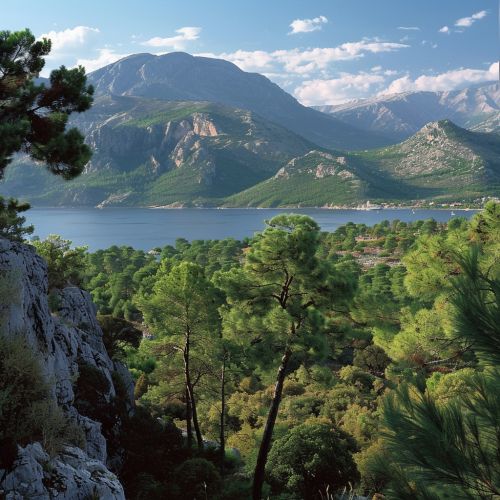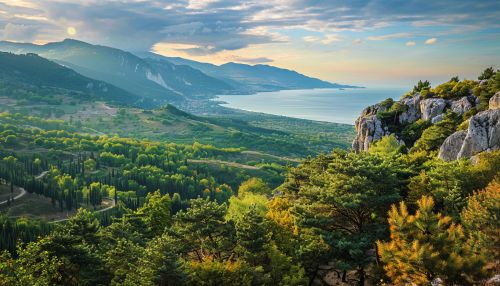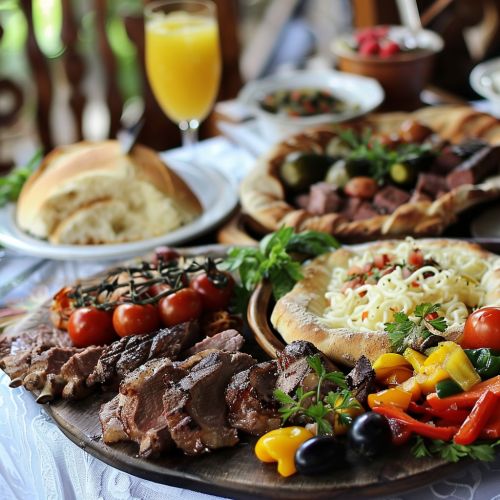Balkan Peninsula
Geography
The Balkan Peninsula, also known as the Balkans, is a geographic region in southeastern Europe. The region takes its name from the Balkan Mountains, which run through the center of Bulgaria into eastern Serbia. The region's total area is approximately 470,000 square kilometers, making it slightly larger than Spain.


The northern boundary of the peninsula is variously defined. The Danube River is a common reference, but some definitions include the entire region north to the Slovak-Austrian border. The southern boundary is the Mediterranean Sea. To the east, the peninsula is bounded by the Black Sea and the Aegean Sea, while the Adriatic Sea marks its western edge.
The Balkan Peninsula is characterized by its mountainous terrain, with several major mountain ranges including the Balkan Mountains, the Rhodope Mountains, and the Dinaric Alps. The region is also home to several significant bodies of water, including the Danube River, the Sava River, and the Drina River. The Balkan's diverse topography also includes several large plains, such as the Pannonian Plain in the north and the Thracian Plain in the south.
History
The history of the Balkan Peninsula is marked by its strategic location between Europe and Asia, and its proximity to the Mediterranean Sea. This has made it a crossroads of various cultures and civilizations, from the ancient Greeks and Romans, through the Byzantine and Ottoman empires, to the various nation-states that exist today.
The first known civilizations in the Balkans were the Thracians, Illyrians, and Greeks. The region was later conquered by the Roman Empire, which left a significant cultural and architectural legacy. After the fall of the Western Roman Empire, the Eastern Roman Empire, also known as the Byzantine Empire, became the dominant power in the region.
The Balkans were later invaded by the Ottoman Empire, which ruled the region for several centuries. The Ottoman period had a profound influence on the culture, religion, and politics of the region. The Balkans were the scene of numerous uprisings and wars of independence against Ottoman rule.
In the 19th and 20th centuries, the Balkans were the site of several major conflicts, including the Balkan Wars, World War I, and World War II. The region also experienced significant political and social changes, including the rise and fall of communism.
Culture
The culture of the Balkan Peninsula is diverse, reflecting its long history and the influence of numerous different civilizations. The region is known for its rich traditions in music, dance, and cuisine, as well as its distinctive architecture and art.
The Balkans are home to several major religions, including Orthodox Christianity, Islam, and Catholicism. The region's religious diversity is a result of its complex history, with different parts of the peninsula having been influenced by the Byzantine Empire, the Ottoman Empire, and the Roman Catholic Church.
The Balkan Peninsula is also known for its linguistic diversity. The region is home to several different language families, including Indo-European, Turkic, and Uralic. The most widely spoken languages in the Balkans are Bulgarian, Greek, Turkish, and Serbo-Croatian.


Economy
The economy of the Balkan Peninsula is diverse and varies by country. The region's economy is characterized by a mix of agriculture, industry, and services. Agriculture is particularly important in the rural areas of the peninsula, with crops including wheat, corn, sunflowers, and fruits.
The Balkans are also rich in natural resources, including coal, oil, natural gas, and minerals. The region's industrial sector includes steel production, shipbuilding, and the manufacture of textiles, machinery, and electronics.
Tourism is a significant part of the economy in many Balkan countries, with visitors drawn to the region's rich history, diverse culture, and natural beauty. The peninsula's coastal areas, particularly those along the Adriatic and Aegean seas, are popular tourist destinations.
